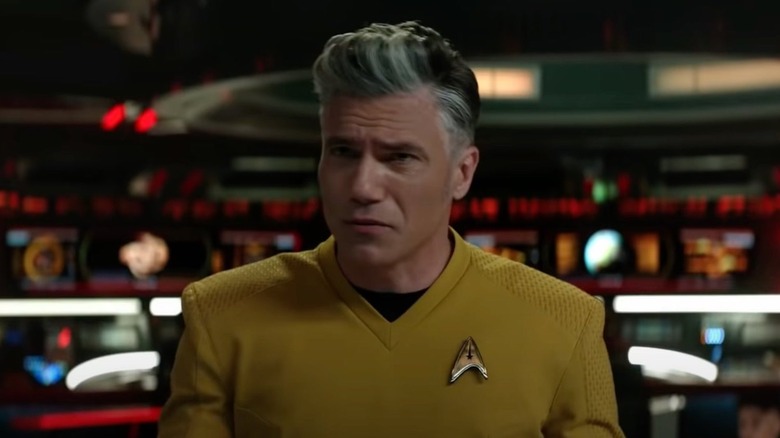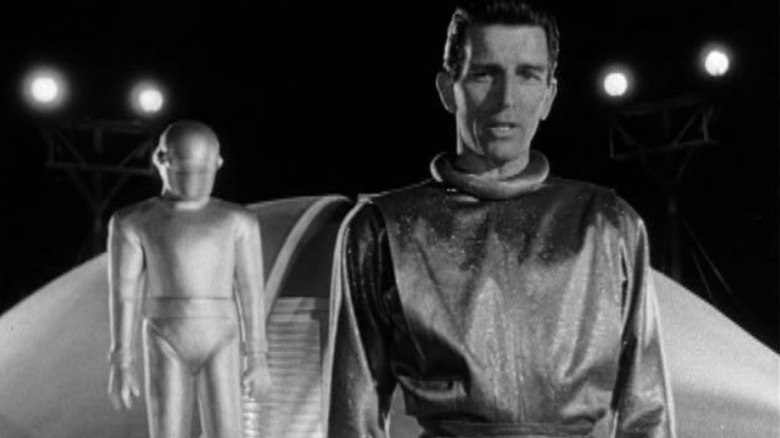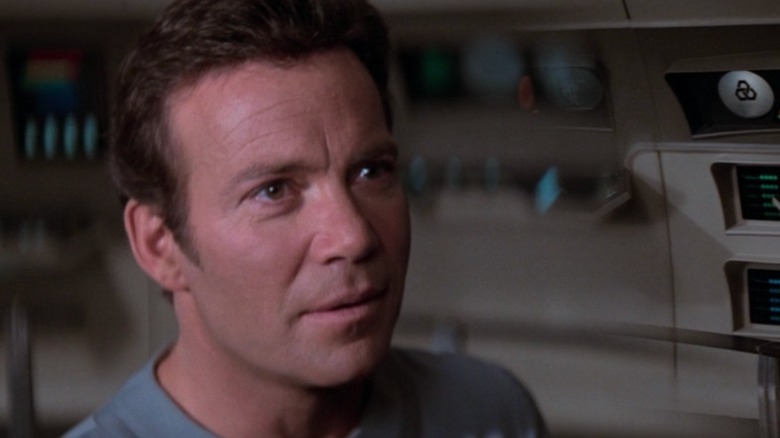The Sci-Fi Classic Featured In Star Trek: Strange New World Has A Cool Trek Connection
This post contains minor spoilers for the first episode of "Star Trek: Strange New Worlds."
"Star Trek: Strange New Worlds" begins with a mission statement. It's not Captain Kirk's traditional spiel about "boldly going where no man has gone before." It's also not series protagonist Captain Pike's (Anson Mount) words of wisdom that introduce the newest "Trek" series. Instead, it's a familiar monologue for sci-fi lovers, spoken by an alien man called Klaatu.
The new Paramount+ show begins with a brief nod to the concept of "first contact," showing the experience of discovery not through the eyes of the Enterprise crew, but through the eyes of aliens discovering a starship. Directly after, the episode cuts to the snowy, windblown landscape of Bear Creek, Montana, where Captain Pike is holed up on shore leave. As he makes breakfast for his lover, the classic science fiction film "The Day The Earth Stood Still" plays on the TV. Klaatu's final monologue from the film plays in voiceover before we even see the captain, a sign to sit up and pay attention. The episode itself only provides a snippet of the speech, but here's the whole thing:
"The universe grows smaller every day, and the threat of aggression by any group, anywhere, can no longer be tolerated. There must be security for all, or no one is secure. Now, this does not mean giving up any freedom, except the freedom to act irresponsibly. Your ancestors knew this when they made laws to govern themselves and hired policemen to enforce them. We, of the other planets, have long accepted this principle. We have an organization for the mutual protection of all planets and for the complete elimination of aggression."
It's a cold war classic
Released in 1951, "The Day The Earth Stood Still" became a science fiction touchstone for its Cold War commentary. The movie begins with a flying saucer visiting Earth with tidings of collaboration and shared technology — only to be promptly shot by the U.S. military. The alien, Klaatu (Michael Rennie), only encounters more trouble from there. In the film's ominous final scene, he delivers the above speech before warning earthlings that their present path leads only to destruction. He delivers an ultimatum, asking earth to join his interplanetary organization, and the film ends with his departure.
"The Day The Earth Stood Still" wore its heart on its sleeve by setting its story directly in the era it was commenting on, but the humanistic sci-fi titans who followed — including Rod Serling and "Star Trek" creator Gene Roddenberry himself — would couch similar moral critique in more allegorical storytelling. Klaatu tries to preach non-violence and collaboration among all peoples, something earthlings in the film and audiences in real life alike tend to have a hard time pulling off. Roddenberry would do the same in the next decade, when the crew of the U.S.S. Enterprise pledged to "seek out new life and new civilizations" with intergalactic allyship in mind.
Trek has always shared these values
The original run of "Star Trek" showed a space-eye view of the Cold War just like "The Day The Earth Stood Still Did," in episodes that portray civilizations on the brink of warfare, like war games classic "A Taste of Armageddon." Roddenberry imagined a galaxy that, no matter how expansive, still fell into the same pitfalls as humanity, with alien societies often threatening to destroy themselves in the process. Yet no matter who they faced, Captain Kirk (William Shatner), Mr. Spock (Leonard Nimoy), and their crew always had words of measured wisdom — not unlike Klaatu's — for the struggling, violent worlds.
Pike's choice of morning entertainment in "Strange New Worlds" is a sort of mission statement, one that will no doubt carry on through the series. It's about as close to conveying the spirit of Gene Roddenberry as the show can get without actually playing an episode from "The Original Series" on Pike's TV. And there's another connection between the two stories, too: Robert Wise, who directed "The Day The Earth Stood Still," would go on to helm the very first "Trek" film, "Star Trek: The Motion Picture."
The first episode of "Star Trek: Strange New Worlds" is an impressive start for a series that has plenty to prove, and it sets the tone perfectly with this classic, grounded sci-fi reference.


